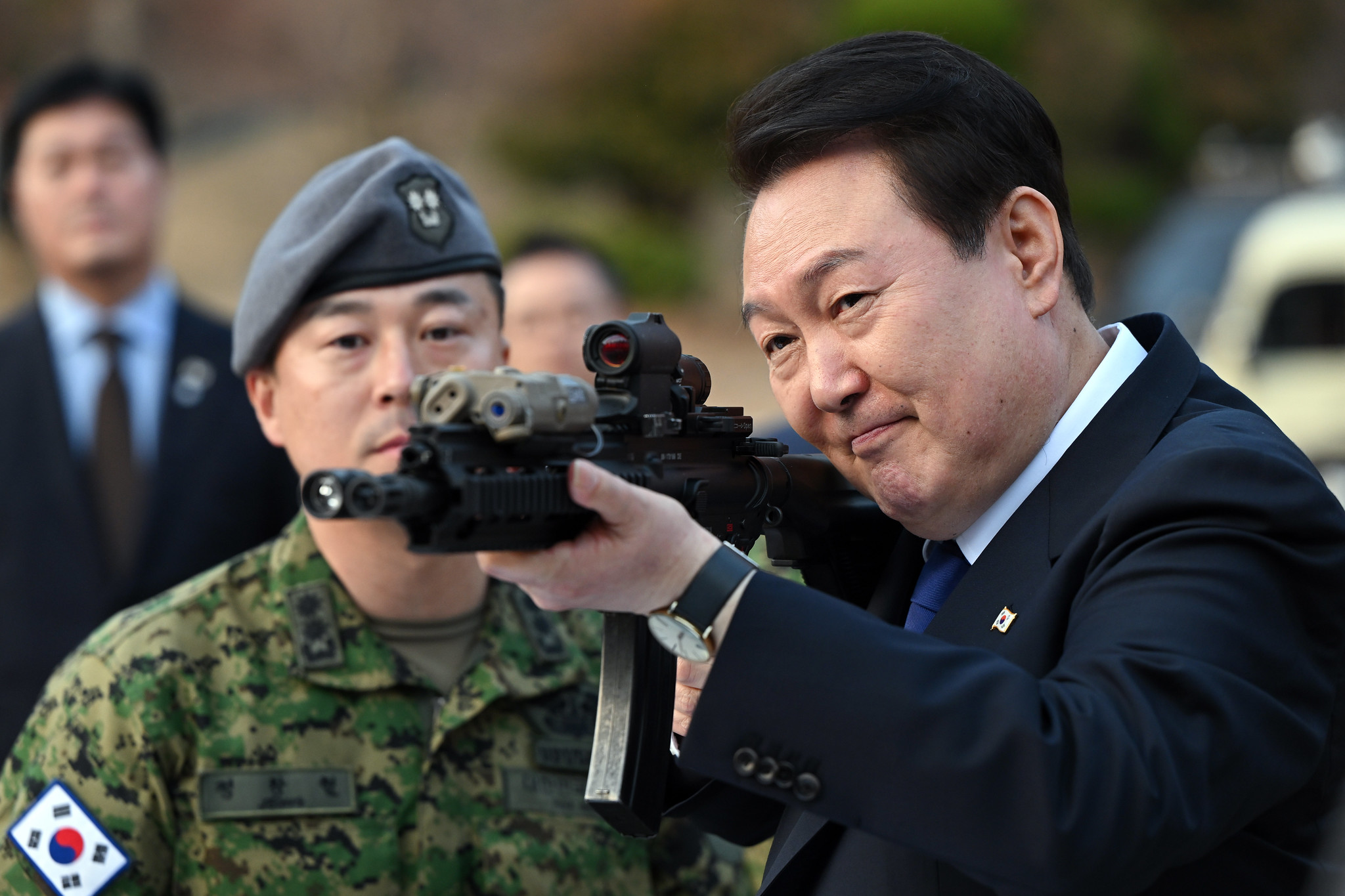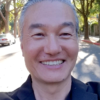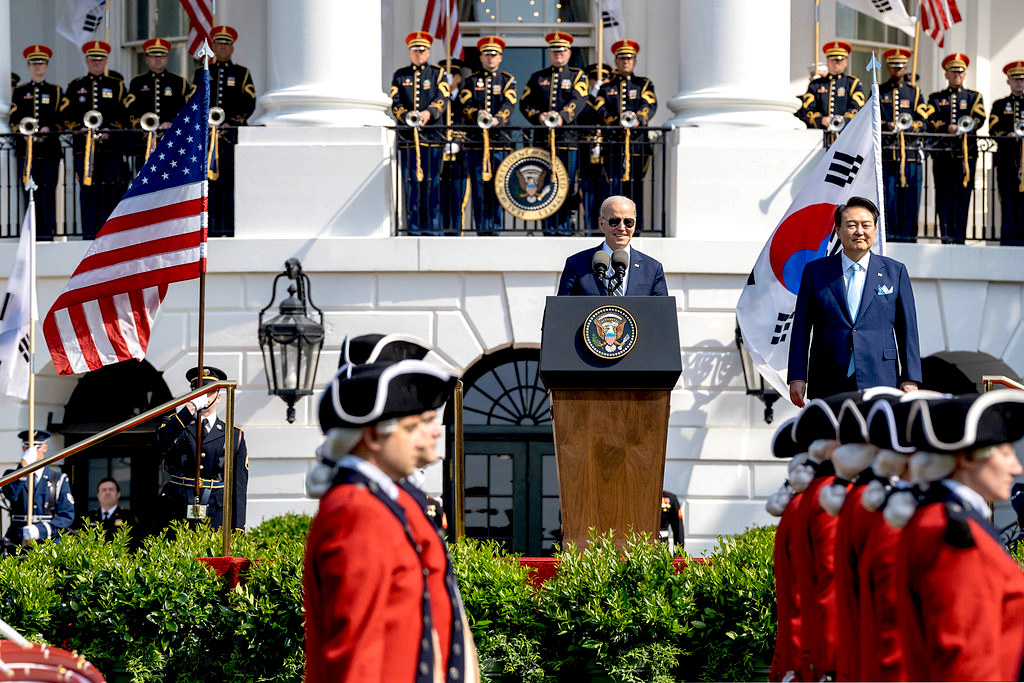Yoon does not want to lose power, writes Kiji Noh, but more importantly the U.S. cannot allow Yoon to lose power. He is key to the Asian force posture against China.

South Korea’s President Yoon Suk Yeol visits the Navy Special Warfare Flotilla in Jinhae, Gyeongsangnam-do Province, on March 10, 2023. (Republic of Korea, Flickr, CC BY-NC-SA 2.0)
By Kiji Noh
Special to Consortium News
 South Korean President Yoon Suk Yeol on Tuesday declared martial law, suspended the South Korean legislature and banned elected representatives from accessing the National Assembly building using massive police presence.
South Korean President Yoon Suk Yeol on Tuesday declared martial law, suspended the South Korean legislature and banned elected representatives from accessing the National Assembly building using massive police presence.
And then six hours later he rescinded the order.
President Yoon had declared in a public address to the Korean people that the move was to protect a “liberal South Korea from the threats posed by North Korea’s communist forces and to eliminate anti-state elements.” He said:
“I will restore the country to normalcy by getting rid of anti-state forces as soon as possible.”
But all the members of South Korea’s National Assembly, which Yoon had shut down, voted to reverse Yoon’s edict Tuesday and he then heeded the call.
The action and rhetoric had evoked the days of the country’s military dictatorships; the language and justification was exactly the same.
There had been repeated signals that Yoon could declare martial law because the public momentum to impeach him in South Korea was gaining ground.
Yoon is despised by South Koreans for his abuse of power, his wife’s corruption and his vitiation of South Korea’s sovereignty and economic wellbeing to serve U.S. geopolitical interests.
Particularly triggering and enraging for South Koreans has been his enmeshing of South Korea’s military with that of its former colonizer, Japan, through a formal military alliance designed to wage war against China. This has also entailed engaging in radical historical revisionism and erasure to facilitate this extraordinary coalition.
Last week 100,000 citizens protested in the streets demanding his immediate resignation — something that received absolutely zero coverage in Western media. There was still little mention of this in current mainstream Western coverage as a factor for the short-lived declaration of martial law.
Yoon does not want to lose power, but more importantly the U.S. cannot allow Yoon to lose power: He is essential to shore up alliances, agreements, and an Asian force posture to wage war against China.

President Joe Biden delivers remarks during Yoon’s arrival ceremony in Washington, April 2023. (White House, Erin Scott)
If Yoon goes, the forcefield breaks. This is because South Korea is the key proxy, the proxy with the largest military force in the area (500,000 active troops plus 3.1 million reservists). This massive military manpower falls immediately under U.S. operational control, the moment the U.S. decides it wants to wage war.
Yoon, who was elected with the narrowest electoral victory in Korean history (0.7 percent), is a U.S. client, supported precisely for making promises of implementing a South Korean “Indo-Pacific strategy,” a clone of the U.S. Indo-Pacific strategy, a belligerent, escalatory, military-hybrid strategy to encircle and take down China.
When Yoon was elected, champagne corks flew in Washington. If Yoon had chosen to perpetuate rule through martial law, the U.S. would have likely closed their eyes to it, as they did for decades under Park Chung Hee and Chun Doo Hwan. The stakes are very high.
However, unlike his Conservative Party predecessors Park Chung Hee, Chun Doo Hwan and Roh Tae Woo, Yoon is not a former general. In fact, he is a draft dodger, something that usually destroys political careers.
The fact that he was able to rise to the highest office signals that extraordinarily powerful forces (like the U.S. national security state) were instrumental in his ascension to power.
Certainly, they gave him prime time coverage, including access to the most influential media platform in the world: a cover article in Foreign Affairs magazine where he professed his allegiance to U.S. doctrine.
Dangerous and dark times still lie ahead, especially if Koreans rise up (as they always have) and President Yoon responds with massive military and police repression.
K.J. Noh is a political analyst, educator and journalist focusing on the geopolitics and political economy of the Asia-Pacific. He has written for Dissident Voice, Black Agenda Report, Asia Times, Counterpunch, LA Progressive, MR Online. He also does frequent commentary and analysis on various news programs, including The Critical Hour, The Backstory, and Breakthrough News.
Views expressed in this article may or may not reflect those of Consortium News.

Uh, I know its a cultural thing, but perhaps someone should tell the author that in America showing the selfishness to avoid military service, aka draft dodging, as well as perhaps some cunning in how they did it …. in America, this actually enhances a political career.
Clinton and Dubya were both famous for how they dodged active military service in Vietnam. Biden graduated from college in the middle of the Vietnam War, but showed no interest in going to be the last man to die in a losing war. Trump is roughly the same age. Obama and candidate Harris have no military service. All were either President or one heartbeat away. They got to the top or very near the top with no military service and often with apparent deliberate avoidance. Although for the post-Vietnam generations, they did not have to be a variation on a ‘draft dodger’ to stay out of the front lines.
The most recent America President to have served in the military, and in active service in a war, would appear to be George Herbert Walker Bush, who flew a plane (and bailed out) during the fighting in the Pacific in WW2. A torpedo bomber too, so he didn’t bomb from 20,000 ft like Mad Bomber McCain. A different time. Instead of dodging military service or arranging via family connections a stateside posting, he joined the military quickly out of school and became the one of the youngest navy pilots … at least according to his political bios. But, the last American who went that route was so long ago that now you have to distinguish him from his son who famously protected Texas from the Vietcong in the air national guard.
Fascinating how in a coup / martial law situation, nobody pays attention to the military.
A few notes in that regard.
– It has been said that it was the Defense Minister who recommended to the Pres to declare martial law. So, at first this appears to have at least some military support.
– The military did participate in that they did deploy to the building of the national assembly. This was apparently ordered by the Seoul area commanders in support. The national assembly had been declared closed by the declaration of martial law.
BUT
– the military units at the national assembly did not act to keep the national assembly from meeting, and voting to declare an end to martial law. They did not use force to break up the national assembly.
Then it gets even more interesting, Its like any situation with a mutiny. Who’s orders do they follow? The President, or the National Assembly which had ordered the military to leave the national assembly’s area when it voted to end the martial law? The military had a choice to make.
For awhile, the Pres did not respond to the assembly’s motion to end martial law. He had to wait to see what the military was going to actually do. Who’s orders would the soldiers obey?
The soldiers obeyed the national assembly. They left the area as ordered by the legislative branch. A few hours later, the Pres issued the order ending his declaration of martial law. Since the military had left him hanging, he had no alternative. Its very difficult to have a martial law if the military does not go along.
Now, the Defense Minister and the high ranking officers in the Seoul area that participated in the early stages have resigned. The military command at the very top appears to have insisted on the officers resignations. From a distance, South Korean society appears to be both a society where ‘honor’ could demand a resignation and public apology, as well as a society where officials may ‘fall on their sword’ when required.
For now, the military still respected some sort of democracy when they got conflicting orders from the executive and the legislature. Remember, America also keeps military to military relationships, so the relations of the South Korean military with America may be as important as the political ones. Especially in a nation with a history of military dictatorships.
The USA stayed very, very quiet while all of this was going on. Uncle Sam did not appear to speak against the martial law until after it had been cancelled.
Maybe its late breaking news, but Yoon is losing power.
A powerful person in his party, powerful enough to be called ‘the leader’ of the Party, has come out and said that Yoon needs to be removed from power for the good of the nation. Which would likely mean that either Yoon has to resign or the impeachment motion by the opposition parties gets enough ruling party votes to pass. Yoon appears gone either today or tomorrow.
Either way, this was not the first martial law in South Korea since America separated it. South Korea has been traditionally a US backed military dictatorship. Nor is this likely to be the last martial law. This shows that either there will be martial law to control the people before the war begins, or if the people remain obedient and submissive until that date, martial law gets re-declared when the coming war with China begins.
In Wall Street’s Great War for Democracy and Freedom, it appears that democracy and freedom have to be the first casualties of this war in order to save democracy and freedom. But we can of course trust Wall Street to restore fully our democracies and freedoms at some point in the future because Wall Street has always put those American values above more mundane matters like making money.
South Korean law prohibits the exporting of weapons to active conflict zones. There are massive ammo stockpiles that USA wants so martial law is one way to get around that
U.S. support for authoritarians in South Korea goes back to Syngman Rhee, president of its first republic, who ruled with an iron fist.
I understand that the drive to impeach him has, for unknown reasons, suddenly been reversed. Interesting.
Thanks, Kiji Noh , and Consortium News, for this brief yet incisive report. As the article notes, we in the West wouldn’t otherwise get any honest reporting or analysis of this significant event, because any such coverage would, as in so many other instances, divulge the extent of American imperialism and war-mongering.
People in the west can actually get some honest reporting and analysis. They just won’t get it from any one in America. Or perhaps I should say, they won’t get it from any corporation in America.
The world is a big place, and we live in a communications age. We have seen the lifting of the curse related to the Tower of Babel, as now computers can assist in translation quickly and with at least enough accuracy to get the gist of what is being said.
If the only choices are to watch American news, or to turn on a DVD of a favorite old movie, Americans would be better informed about the world by the end of the movie than if they had watched American corporate news. At least they wouldn’t have any new lies in their heads after 90 minutes of a movie they’d seen before.
So sad.
Similar stories in: Japan, Germany, Libya, Lebanon, etc. etc.
This must have embarrassed the US government. All their warnings about North Korea and what Kim Jong Un will do but it was their own ally South Korea which imposed martial law. That’s why they’re keeping a lid on this in the west. It exposes US belligerence.
So now we know why there are so many abysmal leaders in Western countries throughout the world, because this is the only kind of leader that the US empire allows. And these puppet leaders are the only kind of lick-spittle creatures that are willing to sell out their own country and peoples for the sake of some US status and gold. As we can see in the cases of ROC, Japan and the EU, they are dredged from the bottom of the barrel.
Exactly. These “leaders” arrive bought and paid for by psychocapitalism and the war machine.
Democracy itself has been proved an illusion. Even their own political processes are heads-we-win-tails-you-lose.
See France, where King Manny and his minions hold court. Or UK with their austerity slaughter, mass poverty and citizen abuse. Or Germany with their Israel-first law on arts funding. Or….or…..or…
And of course Israel and the US with their bipartisan genocide. Openly murdering hundreds of thousands of people with utter impunity. The most disgusting, inhuman act in generations.
All against the will of the people. All in complete opposition to the majority, even with the accompanying perpetual propaganda.
UN, international law, mainstream media, almost all political parties – dead in the water. They will never be respected again.
We know who the enemy is now.
South Korea is another pseudo democratic puppet state of the United States Empire.
Clear and concise summary! U.S. imperialism wreaking havoc all over the planet as usual. Where is the No War on China campaign? U.S. ruling class wake up and do an analysis of the global correlation of forces. Long past time for diplomacy and coming to terms with history. The world will not allow Europe and its colonial powers to dominate. A new world is emerging out of the darkness.
Over the past year or so I began to wonder why “South Koreans” has seemed so willing to face off with China and to accept American arms. Couldn’t imagine how it might benefit them. Now we can all see why this has been going on. Isn’t it funny how the media always says “the government” when it refers to leaders in power. The actual government is out there in the streets. These elected creatures–like our Biden–are in NO WAY the government. The people are. Drain the swamp!
Many thanks for telling this breaking story. So far, no one else has.
I have immense respect for the Korean people. Quite apart from their formidable capabilities in the “hard” sectors (military prowess, technical / industrial / economic achievements), their soft power has skyrocketed on the world stage, not just with the somewhat formulaic Kpop culture, which has prompted many Westerners to learn Korean, but more importantly in the cinematic field with masterpieces like ‘Parasite’ and ‘Squid game’ which are critiques of the unfairness and injustice of neoliberal economic enslavement. Not to mention this year’s Nobel laureate in literature Han Kang. Journalist KJ Noh continues this pattern of excellence with his insightful analyses of world events, often with a witty take.
I also recommend the works of economist Ha Joon Chang (formerly of Cambridge University) a counterweight to the neoliberal economic conartists.
China is lagging far behind in matters of soft power and has a lot to learn from the Koreans.